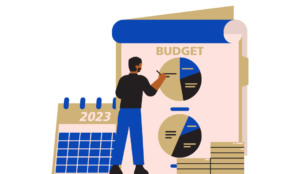A Comprehensive Guide to Getting Your Finances Back on Track
Getting Your Finances Back on Track: A Comprehensive Guide
If you’ve been struggling with overspending or financial difficulties, you’re not alone. Many people face these challenges, but the good news is that there are practical steps you can take to get your finances back on track. This comprehensive guide will provide you with the tools and knowledge you need to regain control of your financial health.
Understanding the Importance of a Budget
The Role of a Budget in Achieving Financial Goals
A budget is more than just a list of your income and expenses. It’s a powerful tool that can help you achieve your financial goals and dreams. By giving every dollar a purpose, a budget can help you prioritize your spending, save for the future, and avoid debt.
How to Create an Effective Budget
Creating a budget involves tracking your income and expenses, setting financial goals, and making a plan to achieve those goals. It’s important to review and adjust your budget regularly to reflect changes in your income, expenses, and financial goals.
You have two options in this scenario. You could increase your dining out budget to $300 and reduce other areas of your budget to compensate. For example, you might decide to cut back on entertainment or clothing expenses.
Alternatively, you could decide to stick to your original $200 budget for dining out and look for ways to reduce your spending in this area. This might involve eating out less frequently, choosing less expensive restaurants, or taking advantage of specials and discounts.
Remember, the goal of a budget is to help you control your spending and save for your financial goals. If your budget is not aligned with your actual spending habits or your financial goals, it’s important to make adjustments as needed.
Dealing with Overspending and Financial Difficulties
The Stress of Overspending and Unexpected Expenses
Overspending and unexpected expenses can cause significant financial stress. If you’ve ever faced these challenges, you know how overwhelming they can be. However, with careful planning and budgeting, you can prevent these situations in the future.
The Role of an Emergency Fund in Financial Stability
An emergency fund is a savings account that you set aside to cover unexpected expenses or financial emergencies. It can provide a financial safety net and help you avoid debt. You can start by setting aside a small amount each month until you reach your goal.
For example, let’s consider the case of Jane. Jane is a single mother who works full-time. She earns a decent income, but she lives paycheck to paycheck and doesn’t have any savings. One day, her car breaks down and she’s faced with a $1,000 repair bill. Without an emergency fund, Jane is forced to put the expense on her credit card, adding to her debt and increasing her financial stress.
Imagine Jane setting aside $50 monthly for 20 months. With $1,000 in her emergency fund, she easily covers a car repair expense, avoiding debt. An emergency fund provides a financial safety net for handling unexpected expenses without accruing debt.
Practical Tips to Get Your Finances Back on Track
Selling Unused Items
One practical way to improve your financial health is to sell items that you no longer use. You might be surprised at how much you can earn by selling clothes, furniture, or other items in good condition.
Reducing Monthly Bills
Another effective strategy is to reduce your monthly bills. This might involve switching to a cheaper phone plan, canceling unused subscriptions, or negotiating lower rates with your service providers
In fact there are several apps today that will negotiate lower costs for everyday bills like cable or mobile service. A quick Google search could easily find several of these services.
Utilizing Technology to Improve Financial Health
Using Mobile Apps for Budgeting and Saving
There are many mobile apps available that can help you budget, save money, and manage your finances. For example, Acorn is an app that rounds up your purchases and puts the spare change into a savings account. Another app, Digit, sets aside savings based on parameters you set up in the app.
The Benefits of Online Grocery Shopping
Online grocery shopping can also help you save money. By avoiding impulse purchases and sticking to your shopping list, you can reduce your grocery bill significantly.
The Power of Small Steps in Financial Planning
The Importance of Setting Short-Term and Long-Term Goals
The Power of Setting Financial Goals
Setting both short-term and long-term financial goals is vital for effective financial planning. It provides direction and purpose to your financial journey, whether you’re aiming to save for a dream vacation, purchase a new car, or secure a comfortable retirement. By establishing clear goals, you create a mindset of intention and motivation, driving you to make wise financial choices and diligently save towards achieving your aspirations.
The Impact of Small Changes on Long-Term Financial Health
Don’t underestimate the power of small changes. Cutting out a daily coffee, for example, can save you hundreds of dollars a year. Over time, these small savings can add up to significant amounts.
Let’s take the example of a daily coffee purchase. Suppose you buy a $5 coffee every day on your way to work. That adds up to $25 a week, $100 a month, and $1,200 a year. Now, imagine you decide to cut out that daily coffee and make your own at home instead.
The cost of making coffee at home can be as low as $0.25 per cup, depending on the type of coffee you buy. So, your yearly cost for coffee would drop from $1,200 to just $91.25. That’s a savings of over $1,100 in a year!
Now, let’s take it a step further. Imagine you take that $1,100 you saved and invest it in a retirement account that earns an average of 7% interest per year. If you continue to invest the money you save from not buying coffee each year, in 30 years, you would have over $106,000!
This example shows how small changes in our daily habits can have a big impact on our long-term financial health. It’s not just about the money you save today; it’s also about the potential growth of that money over time.
Conclusion
Getting your finances back on track is a journey, not a destination. It requires patience, discipline, and a willingness to make changes. But with the right tools and strategies, you can regain control of your financial health and achieve financial stability and freedom.
Remember, small changes can have a big impact over time. Whether it’s cutting out a daily coffee, selling unused items, or using a budgeting app, every step you take towards financial health is a step in the right direction. And while the journey may be challenging, the rewards – peace of mind, financial security, and the freedom to live life on your own terms – are well worth the effort.
So, start today. Make a budget, set financial goals, and take the first step on your journey to financial health. You’ve got this!
FAQs
Q1: Why is a budget important in achieving financial goals?
A budget is a powerful tool that can help you achieve your financial goals and dreams. By giving every dollar a purpose, a budget can help you prioritize your spending, save for the future, and avoid debt.
Q2: How can an emergency fund contribute to financial stability?
An emergency fund is a savings account that you set aside to cover unexpected expenses or financial emergencies. It can provide a financial safety net and help you avoid debt.
Q3: What are some practical tips to get finances back on track?
Some practical tips include selling items that you no longer use, reducing monthly bills, and utilizing technology such as mobile apps for budgeting and saving.
Q4: How can technology help improve financial health?
There are many mobile apps available that can help you budget, save money, and manage your finances. Online grocery shopping can also help you save money by avoiding impulse purchases and sticking to your shopping list.
Q5: What is the importance of setting short-term and long-term financial goals?
Setting financial goals is an important part of financial planning. Whether you’re saving for a vacation, a new car, or retirement, having a goal can motivate you to save and make smart financial decisions.
Disclaimer: The views and opinions expressed in this blog are solely those of the author and do not represent professional financial advice. The information provided is for general informational purposes only. It is not intended as a substitute for professional financial guidance. If you have specific financial concerns or questions, it is recommended to consult with a licensed financial expert who can provide tailored advice based on your individual circumstances. The author disclaims any liability for any financial decisions or actions taken based on the information provided in this blog.
Mortgage Consultation Today!
Categories
- Credit (4)
- FHA Loans (3)
- Finances (3)
- First Time Home Buyers (6)
- Grab Bag (7)
- Home Technology (1)
- Homebuying Tips (17)
- Inspiration (1)
- Insurance (3)
- Interest Rates (3)
- Loan Process (1)
- Mortgage Financing (14)
- Motivation (1)
- News (1)
- Press Release (8)
- Renovation (2)
- Self Employed (1)
- Tips & tricks (1)
- Uncategorized (134)
- USDA Loans (1)
- VA Loans (2)





